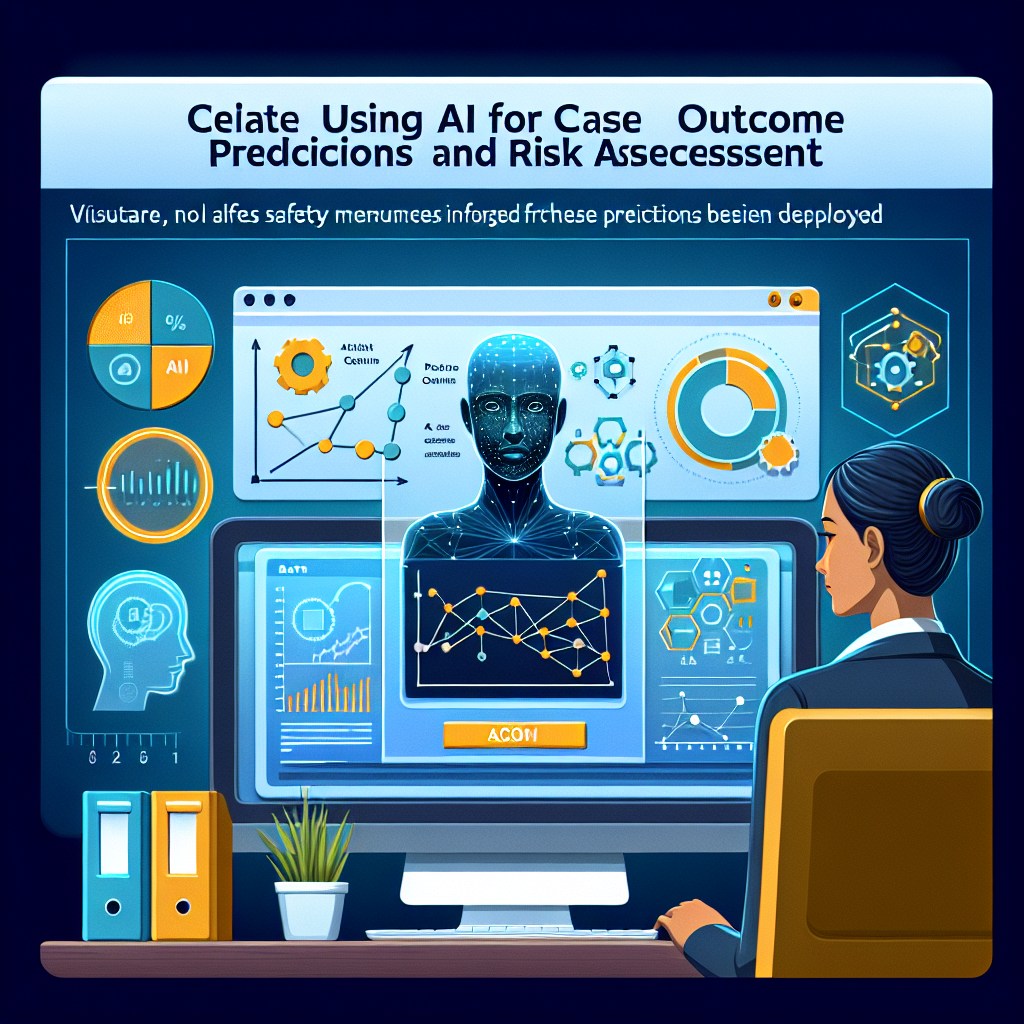Artificial intelligence (AI) has revolutionized many industries, including the legal field. One area where AI is making a significant impact is in case outcome predictions and risk assessment. By analyzing vast amounts of data, AI algorithms can provide lawyers, judges, and other legal professionals with valuable insights into the potential outcomes of cases and the associated risks. This can help them make more informed decisions and better serve their clients.
Case outcome predictions using AI involve analyzing various factors, such as the type of case, the judge’s track record, and the parties involved, to predict the likely outcome of a case. This can help lawyers and their clients understand the strengths and weaknesses of their case and develop a more effective legal strategy. AI can also be used to assess the risk of a particular legal action, such as the likelihood of a settlement or the potential damages that may be awarded in a lawsuit.
One of the key benefits of using AI for case outcome predictions and risk assessment is its ability to process and analyze large amounts of data quickly and accurately. AI algorithms can sift through vast amounts of legal documents, court filings, and other relevant information to identify patterns and trends that may be missed by human analysts. This can help legal professionals save time and resources, as well as make more informed decisions based on data-driven insights.
In addition to analyzing historical data, AI can also take into account real-time information to provide more up-to-date predictions and assessments. For example, AI algorithms can monitor news articles, social media posts, and other sources of information to identify potential factors that may impact the outcome of a case. This can help legal professionals stay ahead of the curve and adapt their strategies as new information becomes available.
Another advantage of using AI for case outcome predictions and risk assessment is its ability to provide unbiased and objective insights. Unlike human analysts, AI algorithms do not have inherent biases or preconceived notions that may influence their analysis. This can help ensure that legal professionals receive accurate and impartial assessments of their cases, allowing them to make more informed decisions based on the data.
However, while AI can offer valuable insights into case outcomes and risks, it is important to remember that it is not a replacement for human judgment and expertise. Legal professionals should use AI as a tool to supplement their own knowledge and experience, rather than relying solely on AI-generated predictions. By combining the insights provided by AI with their own expertise, legal professionals can make more informed decisions and provide better representation for their clients.
In conclusion, using AI for case outcome predictions and risk assessment can offer significant benefits for legal professionals and their clients. By analyzing vast amounts of data quickly and accurately, AI algorithms can provide valuable insights into the potential outcomes of cases and the associated risks. This can help legal professionals make more informed decisions and develop more effective legal strategies. While AI is not a replacement for human judgment and expertise, it can be a valuable tool for supplementing and enhancing the capabilities of legal professionals.
FAQs:
1. How accurate are AI predictions for case outcomes?
AI predictions for case outcomes can be quite accurate, depending on the quality and quantity of data available for analysis. AI algorithms can analyze large amounts of data to identify patterns and trends that may be missed by human analysts, leading to more accurate predictions.
2. Can AI predict the outcome of complex legal cases?
AI algorithms can be trained to analyze complex legal cases and provide predictions for their outcomes. By analyzing various factors, such as the type of case, the judge’s track record, and the parties involved, AI can offer valuable insights into the potential outcomes of even the most complex cases.
3. How can legal professionals use AI for risk assessment?
Legal professionals can use AI for risk assessment by analyzing various factors, such as the likelihood of a settlement, the potential damages that may be awarded in a lawsuit, and the impact of external factors on the case. By using AI-generated insights, legal professionals can assess the risks associated with a particular legal action and make more informed decisions.
4. Is AI biased in its predictions for case outcomes?
One of the key benefits of using AI for case outcome predictions is its ability to provide unbiased and objective insights. Unlike human analysts, AI algorithms do not have inherent biases or preconceived notions that may influence their analysis, leading to more impartial predictions.
5. How can legal professionals ensure the accuracy of AI predictions?
To ensure the accuracy of AI predictions, legal professionals should provide high-quality data for analysis, regularly update the AI algorithms with new information, and use AI-generated insights to supplement their own knowledge and expertise. By combining AI insights with human judgment, legal professionals can make more accurate predictions for case outcomes.

